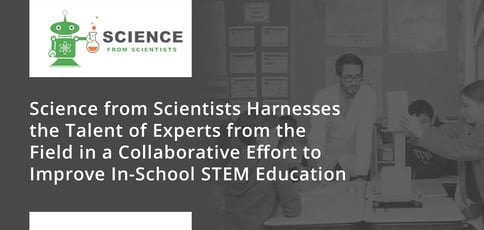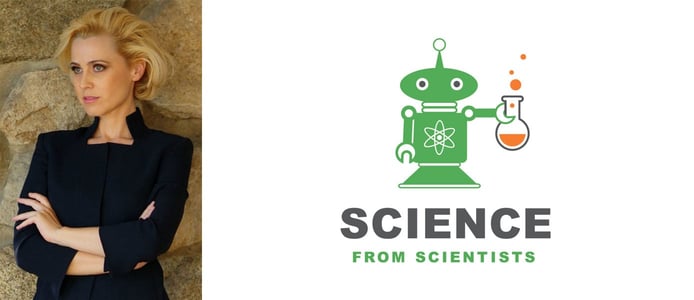
TL; DR: Science from Scientists (SFS) provides schools and organizations with engaging programs that ignite student interest and improve competency in STEM. The group brings in selectively chosen scientists with advanced STEM degrees to deliver interactive lab-based lessons. As the program evolves in the face of COVID-19, the mission of SFS remains the same: to positively impact as many children as possible while filling a workforce pipeline with talented, competent individuals.
STEM education programs, intended to drive global competition and sustain economic growth, lay the foundation for future innovation in the U.S.
But strength lies in numbers.
If such programs are only accessible to a select group of today’s young learners, we can’t expect a diverse and robust presence in those fields tomorrow. Instead of curbing the STEM crisis in this country, we will have effectively eliminated pathways to the American dream.
Biochemist Dr. Erika Ebbel Angle, Founder of Science from Scientists (SFS), told us that the solution is simple: Educators must ensure universal access to STEM literacy programs at a young age.

Biochemist Dr. Erika Ebbel, Founder of Science from Scientists (SFS), gave us a detailed view of the unique STEM program.
“We offer an in-school program, which is very important if you want to reach every student — not just the ones whose parents have the time or money to enroll them in an afterschool program,” Erika said. “We want every single child to have access to STEM learning opportunities.”
To do so, SFS sends real-life scientists with advanced STEM degrees to deliver in-class lessons and labs based on state and national curriculum requirements. The collaborative program is cost-effective and scalable, with the ultimate goal of educating and inspiring the next generation of STEM professionals.
This year, SFS brought engaging STEM programs to more than 11,000 students and 88 schools via its In-School Module-Based (ISMB) program, which provides up to 18 additional hours of STEM enrichment per student each academic year.
Today, the program is evolving as the nation grapples with COVID-19. But SFS’s mission remains the same: to impact as many children as possible while building a well-prepared STEM workforce.
A Mission to Inspire the Next Generation of STEM Leaders
Erika told us that the organization’s roots go back to her childhood.
“Both of my parents were immigrants who came to the United States with very little, and they built for themselves a reasonable existence, a comfortable life,” she said. “Growing up, I was always reminded of the importance of giving back — they reminded me that we we were lucky.”
Erika’s mother, a nurse (now retired) in California, often brought her daughter to health clinics where the less fortunate could receive care. This sparked an interest in volunteering that she pursued from age 12 until adulthood.
“I started volunteering at a local community center, one day a week doing tutoring and the other day teaching piano lessons,” she said. “It was a lot of fun to watch the kids who didn’t like certain subjects change their minds and say, ‘Wow, I can actually do this.’”
At the same time, Erika was participating in multiple science fair contests. She presented at the Intel Science Talent Search (now the Regeneron Science Talent Search), the Junior Science and Humanities Symposium program, and the California State Science Fair, among others, bringing home several wins.
“I eventually ended up going off to MIT to continue being a science dork,” she said. “I was in Massachusetts by myself, with no money, resources, or connections, and I immediately looked for a community service initiative to get involved with, as this was such an important part of my life, but I couldn’t find anything particularly exciting.”
As the emerging STEM crisis in America began flooding airwaves, Erika started a program to get kids interested in science fair projects.
“There was no staff initially; just me and a couple of friends from MIT that I had roped into the project,” Erika said. “We started some local science fairs for elementary school kids, and ran some large-format science events. Time passed, and I graduated from MIT.”
Never satisfied with good enough, Erika competed in — and won — the Miss Massachusetts pageant in 2004. During the competition, she used her platform in STEM education to speak with thousands of teachers, parents, and children. Based on their feedback, she evolved the SFS program into what it has become today.
In addition to the Massachusetts branch, which opened in 2002, SLF expanded to California in 2014 and Minnesota in 2016.
An In-School Approach to Solving Common Pain Points
Erika told us SFS’s approach is fun and engaging yet highly measurable. The organization’s annual reports outline the program’s impact at various schools.
After the 2016-2017 school year, for example, partner schools in Massachusetts observed an average 14% improvement in the number of fifth grade students scoring at a proficient or advanced level on the Science, Technology, Engineering (STE) Massachusetts Comprehensive Assessment System (MCAS).
According to the 2017 Science from Scientists Annual Report, students showed an average 16% improvement between pre-program and post-program quizzes. In addition, 90% of classroom teachers routinely rate the program as impactful in terms of aptitude and student interest.

The organization runs out of branches spanning the country, with plans for growth in remote learning.
“Every other week, for the entire year, we go into classrooms and teach pedagogical science,” Erika said. “All of the lesson plans are designed in-house — there’s over 100 of them that run the gamut from computer programming to fossils and photosynthesis. We also offer professional development programs for teachers.”
In addition to multiyear partnerships with schools, SFS hosts outreach programs and science theater shows, among other efforts. The organization served as the education partner for the 2017 America’s Cup and recently held a 15-month stage show at Walt Disney World’s Epcot.
Erika told us the best part about running an organization like SFS is the feedback and testimonials from children. “I’ve had kids say things like, ‘I hated science before this, but I want to be a scientist now,’ and even ‘You are the butterfly in my garden, the sunshine in my rain.’”
The most shocking feedback? “We had some kids say, ‘This is way better than The Rise of Skywalker,’” she said. “I told my contacts at Disney that I never thought a day would come when I would hear such a thing.”
Science from Scientists Away from the Classroom
SFS has traditionally been administered in the school setting, but due to COVID-19, the organization — like so many others — is finding creative ways to thrive virtually.
“We’ve been thinking about ways to teach remotely without losing that hands-on, meet a real scientist aspect,” she said. “We always want to perform at the highest level of quality. Hopefully, by September 1, there will be content and material that folks can access no matter where they are.”
In the meantime, kids across the globe can visit Science from Scientists Away from the Classroom for free, bite-sized science lessons and activities.
Despite the hardships, Erika sees a silver lining to the remote learning challenge: the opportunity to reach more students.
“Our shift toward remote learning and virtualization means that our reach is no longer geographic,” she said. “We will need to make sure that everything is seamless, but there is an opportunity there.”
HostingAdvice.com is a free online resource that offers valuable content and comparison services to users. To keep this resource 100% free, we receive compensation from many of the offers listed on the site. Along with key review factors, this compensation may impact how and where products appear across the site (including, for example, the order in which they appear). HostingAdvice.com does not include the entire universe of available offers. Editorial opinions expressed on the site are strictly our own and are not provided, endorsed, or approved by advertisers.
Our site is committed to publishing independent, accurate content guided by strict editorial guidelines. Before articles and reviews are published on our site, they undergo a thorough review process performed by a team of independent editors and subject-matter experts to ensure the content’s accuracy, timeliness, and impartiality. Our editorial team is separate and independent of our site’s advertisers, and the opinions they express on our site are their own. To read more about our team members and their editorial backgrounds, please visit our site’s About page.

